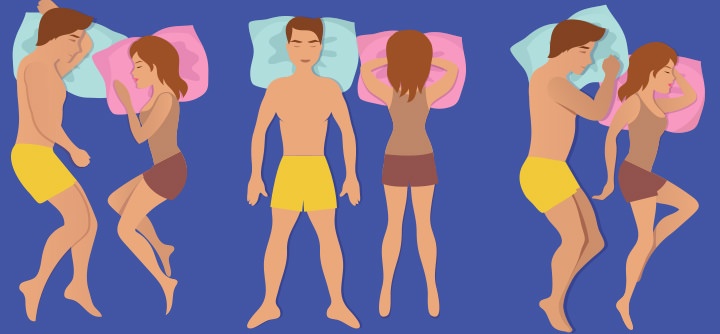As the air is breathed in and out during the night, the surrounding tissue vibrates, causing you to snore. If these muscles relax even further, they can trigger sleep apnea because the complete blockage of the airway stops breathing altogether, forcing you to wake and choke to clear it. This may happen many times a night impacting the quality of your sleep.
If you want to read more about snoring and its effects check out our article, Snoring - should I seek help?
The Supine Sleeping Position

Lying on your back is the worst position for someone who snores or suffers from sleep apnea because, physiologically, gravitational force increases the tendency for the jaw, the tongue and soft palate to drop back toward the throat, which narrows the airways and can lead to breathing difficulties.
The Prone Sleeping Position
 Sleeping on your stomach may seem like the alternative to the gravity issue, as now, the downward force pulls the tongue and palate forward. While this is true to an extent, your mouth and nose end up being either blocked or impaired by your pillow, or your neck has to be twisted to the side to maintain breathing, all of which are counter-productive in clearing the airways to avoid snoring and sleep apnea. Sleeping on your stomach is not ideal as it obstructs breathing.
Sleeping on your stomach may seem like the alternative to the gravity issue, as now, the downward force pulls the tongue and palate forward. While this is true to an extent, your mouth and nose end up being either blocked or impaired by your pillow, or your neck has to be twisted to the side to maintain breathing, all of which are counter-productive in clearing the airways to avoid snoring and sleep apnea. Sleeping on your stomach is not ideal as it obstructs breathing.
The Lateral Sleeping Position
 Research has suggested that sleeping on your side appears to be the most ideal for snoring and sleep apnea sufferers1. When your body is positioned on it's side during rest the airways are more stable and less likely to collapse or restrict air.
Research has suggested that sleeping on your side appears to be the most ideal for snoring and sleep apnea sufferers1. When your body is positioned on it's side during rest the airways are more stable and less likely to collapse or restrict air.
However, this position doesn’t always come naturally to some people. It’s common for people to start on their side, and fall onto their back, where snoring and sleep apnea is at its worst.

To solve this problem, try using a special pillow.
A contoured pillow or one with ‘memory-foam’ which holds its shape can help to guide your body and hold your head in the right position to keep your body aligned in the optimal lateral position. For more tips on best sleeping practices, check out our article on Practicing Good Sleep Hygiene.
How a Free Sleep Assessment can Help You
If you are experiencing problems sleeping, you may wish to consider undertaking a free online sleep assessment to better understand how to improve your restful state and your overall health. The assessment asks you a series of simple questions designed to help you uncover the cause, and the results will be conveniently sent to you via an email.






 Sleeping on your stomach may seem like the alternative to the gravity issue, as now, the downward force pulls the tongue and palate forward. While this is true to an extent, your mouth and nose end up being either blocked or impaired by your pillow, or your neck has to be twisted to the side to maintain breathing, all of which are counter-productive in clearing the airways to avoid snoring and sleep apnea. Sleeping on your stomach is not ideal as it obstructs breathing.
Sleeping on your stomach may seem like the alternative to the gravity issue, as now, the downward force pulls the tongue and palate forward. While this is true to an extent, your mouth and nose end up being either blocked or impaired by your pillow, or your neck has to be twisted to the side to maintain breathing, all of which are counter-productive in clearing the airways to avoid snoring and sleep apnea. Sleeping on your stomach is not ideal as it obstructs breathing. Research has suggested that sleeping on your side appears to be the most ideal for snoring and sleep apnea sufferers1. When your body is positioned on it's side during rest the airways are more stable and less likely to collapse or restrict air.
Research has suggested that sleeping on your side appears to be the most ideal for snoring and sleep apnea sufferers1. When your body is positioned on it's side during rest the airways are more stable and less likely to collapse or restrict air.





Comments